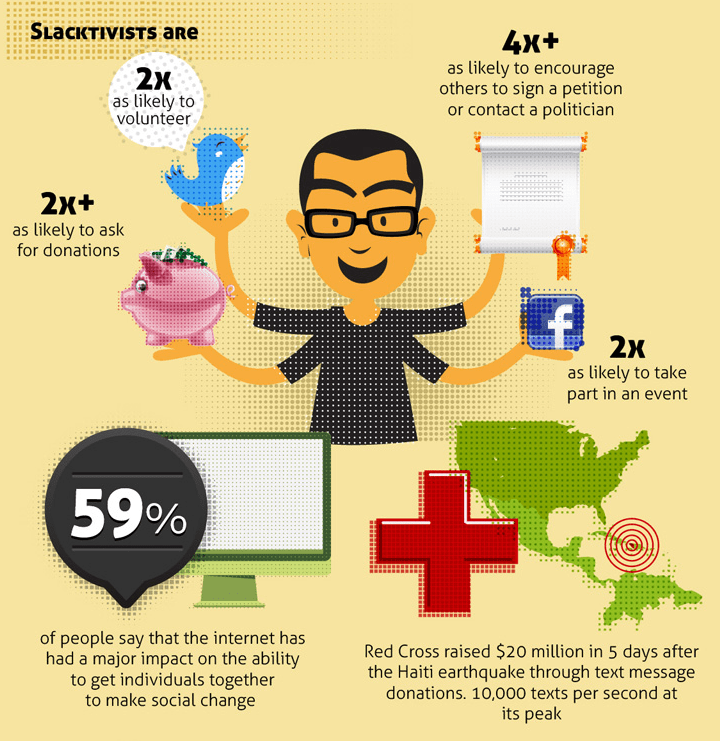With the rise of social media, a new form of activism has made its entrance. Liking explanation posts about white privilege, sharing posts about street intimidation, activism from the sweet comfort of your bed. Slacktivism, a portmanteau of slacker and activism is the new form of sharing one’s societal beliefs. Over the past few years the slacktivist has been taking over the internet, but not without a struggle. The lazy form of activism faces loads of criticism. However, in my opinion slacktivism deserves a lot more appreciation. Therefore, this article will be my ode to slacktivism.
The concept of slacktivism
The term slacktivism mostly refers to little acts of activism that don’t require much political effort, like signing a petition or sharing activist content on social media. The concept is most often used to call out this form of activism. Including the term ‘slacker’ in this type of activism is a way for people to say ‘get up and do something’. The biggest type of criticism that slacktivism deals with is the fact that it wouldn’t help anything. A statement that could be argued, because slacktivism might have a bigger impact than you expect.
A bigger part of your social media, a bigger part of you
The first reason why lazy online activism can have an impact on the real world, is about the impact social media can have on creating one’s identity. Especially during young adolescence, people are developing a stable identity. In these times, the average screen time for young adults is of 5.1 hours each day, social media plays a big part in this process of identity development.
Social media can help us create a better sense of who we are, or who we want to be. When you post more about a certain hobby or characteristic online, this part of your identity will become more important to your offline identity as well. Therefore, when you like and share many activist-toned content on social media, chances are you will consider yourself more of an activist in real life. Your social media posts will make you see and feel yourself more of an activist than before you started slacktivism. Social media effort can help you to make activism a stable and necessary part of who you are.
You can see it as an uplifting cycle where posting more activism on social media makes you feel more of an activist, which makes you act in an activist way more often, making you post even more about it, and so on.
Essentially, slacktivism will make activism a bigger part of your identity, and this renewed self-sense can contribute to your offline effort towards social change. You can see it as an uplifting cycle where posting more activism on social media makes you feel more of an activist, which makes you act in an activist way more often, making you post even more about it, and so on. So even though the posting and liking itself can be seen as lazy, it makes activism a bigger part of yourself which triggers your effort in offline activism.
Consistency
To help your new sense of self actually put in the work, there is a psychological heuristic that comes in to help us, the consistency heuristic. Studies found that we have a strong need to remain consistent with our own opinions, attitudes, words and behavior. In other words, we like to do what we say. So when our social media pages are full of things we say, when the situation occurs we want to do the things in line with the opinions. Bigger actions are often taken after slacktivism. Our brains find it difficult to justify a discrepancy between our words and actions, so we try to let this situation occur as little as possible, resulting in bigger actions after the clicks.

Big actions start small
In these theories of growing, we should not forget that most activism starts small. Even during the most difficult times, like World War II, most people that have showed big actions of resistance have started small. People didn’t start big rescue networks out of the blue, they started with leading police officers the wrong way, or refusing to do the Hitler salute. We have to grant people their first steps into the world of activism, by not immediately disqualifying their actions. Social media can be a great opportunity to educate yourself, spread awareness and even sign important petitions. We cannot expect people to start off with big impactful moves, and online can be an easy accessible place to create a beginning.
In some cases, like the BlackLivesMatter movement, slacktivism can be an opportunity to make the movement a high priority to many more people than before. The #BLM and social media actions have been putting the issue of racism in everyone’s mind resulting in opening many national debates and street protests. Many people have been learning about concepts about racism on social media, and book sales about racism went up all summer.
Losing the slack
Eventually, real change needs people to lose the ‘slack’ and go bigger on the ‘activism’ part. But slacktivism can be a great place to start, and it can have impact. In my opinion, we need to praise slacktivists for their actions and contributions, and motivate them to keep doing the right thing. When slacktivists get more included in movements, the bigger picture can get more effective. More people can be reached, and more people will have a place to start doing something, resulting into more people actively fighting for a cause. So share that post, and sign that petition, and motivate others to do it too. Who knows what can grow out of the clicks.
Cover: Younes Skalli
Edited By: Younes Skalli





